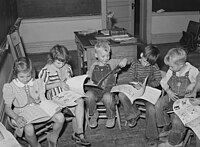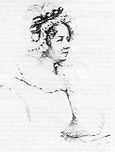Portal:Children's literature
The Children's Literature Portal
Children's literature or juvenile literature includes stories, books, magazines, and poems that are created for children. Modern children's literature is classified in two different ways: genre or the intended age of the reader, from picture books for the very young to young adult fiction.
Children's literature can be traced to traditional stories like fairy tales, that have only been identified as children's literature in the eighteenth century, and songs, part of a wider oral tradition, that adults shared with children before publishing existed. The development of early children's literature, before printing was invented, is difficult to trace. Even after printing became widespread, many classic "children's" tales were originally created for adults and later adapted for a younger audience. Since the fifteenth century much literature has been aimed specifically at children, often with a moral or religious message. Children's literature has been shaped by religious sources, like Puritan traditions, or by more philosophical and scientific standpoints with the influences of Charles Darwin and John Locke. The late nineteenth and early twentieth centuries are known as the "Golden Age of Children's Literature" because many classic children's books were published then. (Full article...)
Selected article
The Hobbit is a fantasy novel and children's book by J. R. R. Tolkien. It was published on 21 September 1937 to wide critical acclaim, being nominated for the Carnegie Medal and awarded a prize from the New York Herald Tribune for best juvenile fiction. The book remains popular and is recognized as a classic in children's literature. Set in a time "Between the Dawn of Færie and the Dominion of Men", The Hobbit follows the quest of home-loving hobbit Bilbo Baggins to win a share of the treasure guarded by the dragon, Smaug. Bilbo's journey takes him from light-hearted, rural surroundings into darker, deeper territory. The story is told in the form of an episodic quest, and most chapters introduce a specific creature, or type of creature, of Tolkien's Wilderland. By accepting the disreputable, romantic, fey and adventurous side of his nature and applying his wits and common sense, Bilbo develops a new level of maturity, competence and wisdom. Themes of personal growth and forms of heroism figure in the story. Along with conflict, these themes lead critics to cite Tolkien's own experiences, and those of other writers who fought in World War I, as instrumental in shaping the story. The author's scholarly knowledge of Anglo-Saxon literature and interest in fairy tales are also often noted as influences. Due to the book's critical and financial success, Tolkien's publishers requested a sequel, which became The Lord of the Rings. The work has never been out of print since the paper shortages of the Second World War. Its ongoing legacy encompasses many adaptations for stage, screen, radio, and gaming, both board and video games.
Selected picture

John Newbery helped popularize children's literature in Britain with the publication of books such as A Little Pretty Pocket-Book (1744).
In this month
- June 1908 – Publication of L. M. Montgomery's Anne of Green Gables, which has since been translated into 20 languages and sold 50 million copies
- June 1938 – First appearance of Superman (pictured), in Action Comics
- 20 June 1941 - Armstrong Sperry awarded the Newbery Medal for Call It Courage
- 25 June 2006 – The Children's Party at the Palace, held in honor of the 80th birthday of Queen Elizabeth II held at Buckingham Palace Garden
- 26 June 1905 - Birth of Lynd Ward, illustrator of 200 juvenile and adult books and one of the founders of the American graphic novel
Selected quote
WikiProjects
- Parent projects
- Literature • Books • Novels
- Main project
- Related projects
- Artemis Fowl • Discworld • Fablehaven • Harry Potter • Inheritance Cycle • Lemony Snicket • Redwall • Oz
What are WikiProjects?
Selected biography
Did you know...
- ... that British sculptor Marcus Cornish has created a sculpture of the fictional Paddington Bear (pictured) and a statue of Jesus Christ dubbed "Jesus in Jeans" by the media?
- ... that The West Wing actor Dulé Hill voiced the audiobook of Jacqueline Woodson's young adult novel Miracle's Boys?
- ...that the children's book Don't Forget the Bacon! was used in an education case study teaching students about reliability of spoken language?
Featured content
Featured articles
 Chinua Achebe
Chinua Achebe Argosy (magazine)
Argosy (magazine) Bronwyn Bancroft
Bronwyn Bancroft Enid Blyton
Enid Blyton The Coral Island
The Coral Island Edmund Evans
Edmund Evans Ian Fleming
Ian Fleming The Fox and the Hound (novel)
The Fox and the Hound (novel) Anne Frank
Anne Frank The Guardian of Education
The Guardian of Education The Hardy Boys
The Hardy Boys The Hunger Games (novel)
The Hunger Games (novel) Lad, A Dog
Lad, A Dog Ursula K. Le Guin
Ursula K. Le Guin Julianne Moore
Julianne Moore Baron Munchausen
Baron Munchausen The Phantom Tollbooth
The Phantom Tollbooth Proserpine (play)
Proserpine (play) Talbot Baines Reed
Talbot Baines Reed Sally Ride
Sally Ride J. K. Rowling
J. K. Rowling Scoops (magazine)
Scoops (magazine) Mary Martha Sherwood
Mary Martha Sherwood The Story of Miss Moppet
The Story of Miss Moppet Tom Swift
Tom Swift To Kill a Mockingbird
To Kill a Mockingbird J. R. R. Tolkien
J. R. R. Tolkien When Megan Went Away
When Megan Went Away A Wizard of Earthsea
A Wizard of Earthsea Mary Wollstonecraft
Mary Wollstonecraft
Featured lists
Categories
Topics
Children's literature: Book talk • Children's literature criticism • Children's literature periodicals • International Children's Digital Library • Native Americans in children's literature
Young adult literature: Gay teen fiction • Lesbian teen fiction • List of young adult authors • Young Adult Library Services Association
Associations and awards: Children's Book Council of Australia • CBCA book awards • Governor General's Literary Award for Children's Literature and Illustration • IBBY Canada • American Library Association • Association for Library Service to Children • Newbery Medal • Caldecott Medal • Golden Kite Award • Ezra Jack Keats Book Award • SCBWI • Sibert Medal • Laura Ingalls Wilder Medal • Batchelder Award • Coretta Scott King Award • Belpre Medal • Carnegie Medal • Kate Greenaway Medal • Nestlé Smarties Book Prize • Guardian Award • Hans Christian Andersen Award • Astrid Lindgren Memorial Award • Society of Children's Book Writers and Illustrators
Lists: List of children's classic books • List of children's literature authors • List of children's non-fiction writers • List of fairy tales • List of illustrators • List of publishers of children's books
Things you can do

|
|



















